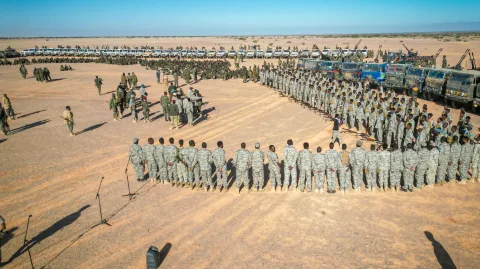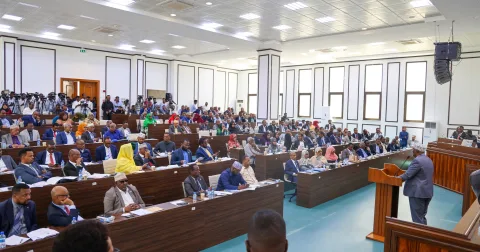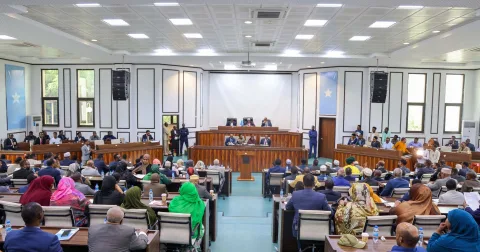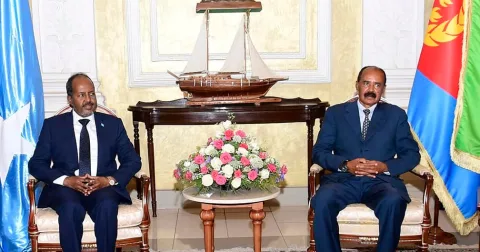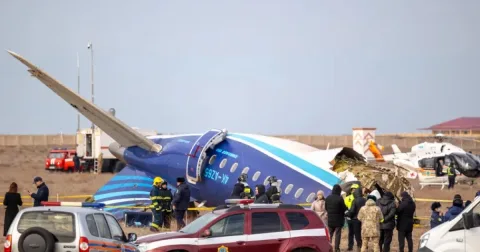Hundreds of Kenyan troops ventured deep into Somalia on Monday to hunt Al Shabaab fighters blamed…

Hundreds of Kenyan troops ventured deep into Somalia on Monday to hunt Al Shabaab fighters blamed for a spate of kidnappings, prompting the Al Qaeda group to threaten reprisals in the heart of Nairobi.
Aljazeera Video
Backed by aerial bombings and guided by pro-government Somali forces, Kenyan troops moved deeper into southern Somalia, a day after Nairobi declared war on the Shebab militia and confirmed that it had sent its army across the border.
Kenyan soldiers were reported near the village of Qoqani, some 50 miles inside southern Somalia, an Al Shabaab stronghold.
“The Kenyan troops supported by tanks and other military vehicles have taken up positions near Qoqani,” said Saleban Mohamed, an elder in a nearby village.
“I saw around 32 trucks and tanks, with hundreds of troops,” he added.
“The Kenyan soldiers are heavily armed and they have started digging trenches near Qoqani,” Abdulahi Sayid Adam, another witness said.
“The Kenyan forces have crossed about 100 kilometres deep into Somalia and in some cases their military aircraft have bombed inside Somalia. If they continue this way, they will regret and feel the consequences back home,” Al Shabaab spokesman Sheikh Ali Mohamud Rage told reporters at a press conference.
“Kenya has peace, its cities have tall buildings and business is booming there, while Somalia is in chaos. If your government ignores our calls to stop its aggression on Somali soil, we will strike at the heart of your interests,” he said, addressing the Kenyan population.
Kenya confirmed on Sunday its forces have crossed the border into war-torn Somalia to fight hardline Al Shabaab forces they accuse of kidnapping foreigners.
Hassan Turki, a senior southern Al Shabaab leader, immediately promised that his men would force the Kenyan troops “to test the pain of the bullets.”
Al Shabaab fighters were reported on Monday to be boosting defences and sending “hundreds” of fighters towards Kenyan and government positions.
“I saw around 50 trucks and pickup trucks mounted with machine guns, with hundreds of fighters heading towards the Kenyan border,” Abdi Jumale, a resident in the rebel-held port of Kismayo told AFP by telephone.
Al Shabaab commanders confiscated at least a hundred trucks late Sunday from the Lower Shabelle region, outside the capital Mogadishu, to transport gunmen southwards towards the battle zones, witnesses said.
“Many trucks were taken by Al Shabaab from civilians to transport fighters, they are heading towards the Juba regions,” a witness in Afgoye district near Mogadishu told AFP, asking not to be named for security reasons.
“They have collected all weapons near Afgoye, and gathered hundreds of young fighters to face their enemy,” another witness said.
Five Kenyan soldiers died when their military helicopter providing air cover for ground troops crashed late Sunday due to reported “technical problems” near Liboi, just inside Kenya’s border, army spokesman Emmanuel Chirchir said.
The assault came after Kenya’s Internal Security Minister George Saitoti vowed to attack the Al Shabaab “wherever they will be.”
In the past five weeks a British woman and a French woman have been abducted from beach resorts in two separate incidents, dealing a major blow to Kenya’s tourism industry.
On Thursday, two Spanish aid workers were seized by gunmen from Kenya’s crowded Dadaab refugee camp, the world’s largest with some 450,000 mainly Somali refugees.
It was unclear how long Kenyan troops planned to stay in Somalia but Nairobi had been under growing pressure to take action and attempt to restore confidence that it could safely host tourists and one of the world’s largest aid communities.
The Al Shabaab had long refrained from carrying out attacks inside Kenya, which observers argued was useful to them as a logistical and financial base.
While Kenya troops have frequently been reported to have crossed the long porous border in recent years, Nairobi had never confirmed any involvement and was always cautious to minimise its exposure to reprisals.
In July 2010, the Al Shabaab group claimed responsibility for suicide attacks in central Kampala that killed at least 76 people in what it said was retaliation for Uganda’s leading role in the Mogadishu-based African peace force.
The Al Shabaab had repeatedly warned similar attacks would target any regional power sending forces to support the Western-backed Somali government.
